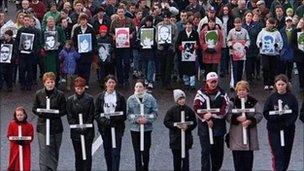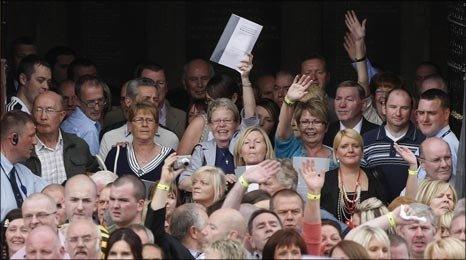Disagreement over last Bloody Sunday march
- Published

A march traditionally takes place in Derry each year to mark the anniversary of Bloody Sunday
The decision to end the annual Bloody Sunday march in Londonderry has been criticised by a relative of the of the victims.
Thirteen people died when British paratroopers opened fire on a civil rights march in Derry in January 1972.
March organisers had said that the last march would take place this Sunday.
Kate Nash, whose brother William was killed on Bloody Sunday, said she felt the move was "very premature".
A statement signed by the majority of the families said the march was no longer necessary after the Saville Report exonerated the dead and wounded.
Ms Nash, however, said she did not understand how the decision came about to end the commemoration march.
"It was dropped on us like a ton of bricks, completely unexpectedly. Who decided the march should end and why?" she said.
"The people of Derry were not afforded the opportunity of having an opinion about this and I feel they should have had.
"They have supported this march for 39 years and I think the least that could have been done was to get their opinion on it.
"The only purpose I can see in this is that it's an annual embarrassment to the British government about what they did."
Tony Doherty, whose father Paddy was also killed on Bloody Sunday, said he supported the ending of the march.
"There has been much debate about this within families and others in the city of Derry," he said.
"Coming up to the 39th anniversary. the families met twice about this because we were obviously aware that there were differences of opinion.
"The vast majority of the families felt that what we had brought about, what we had achieved on 15 June, with the Saville Report as an exoneration, with the words of David Cameron, with apology and accepting political responsibility for the atrocity of Bloody Sunday, that it was now time for us all to consider moving on."
Thousands of people are expected to take part in the final march on Sunday.
A number of options are now being considered to mark future anniversaries, including an annual gathering of remembrance at the Bloody Sunday monument, a remembrance Mass, a human rights weekend and an annual Bloody Sunday lecture.
Clarification 9 April 2019: This article was amended to remove a reference to the death of John Johnston. This reflects the Bloody Sunday Inquiry's finding about Mr Johnston's death several months after he was wounded in Derry on 30 January 1972. The inquiry report states that his death was "not the result of any of the wounds he sustained on Bloody Sunday".
- Published31 December 2010
- Published15 June 2010
